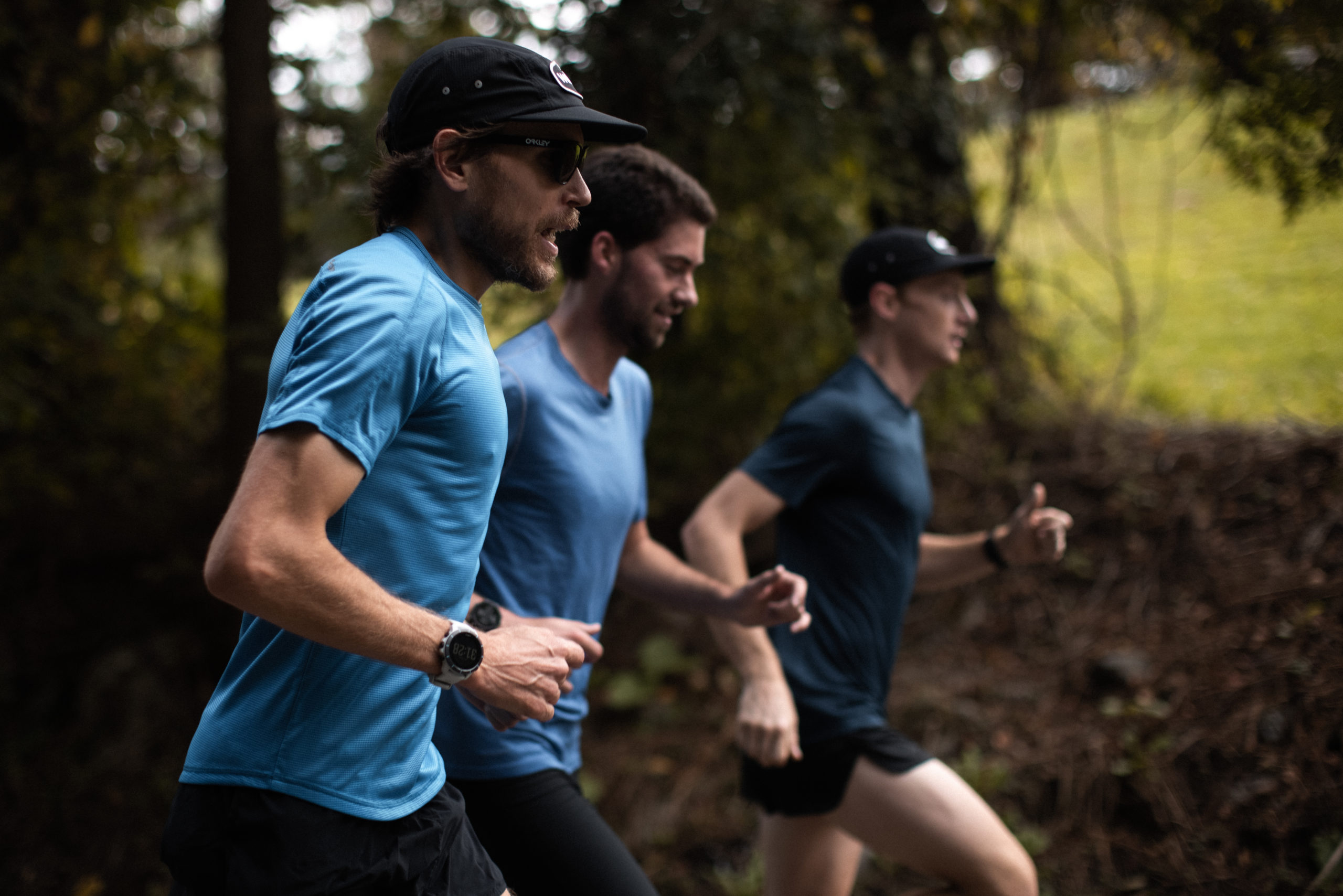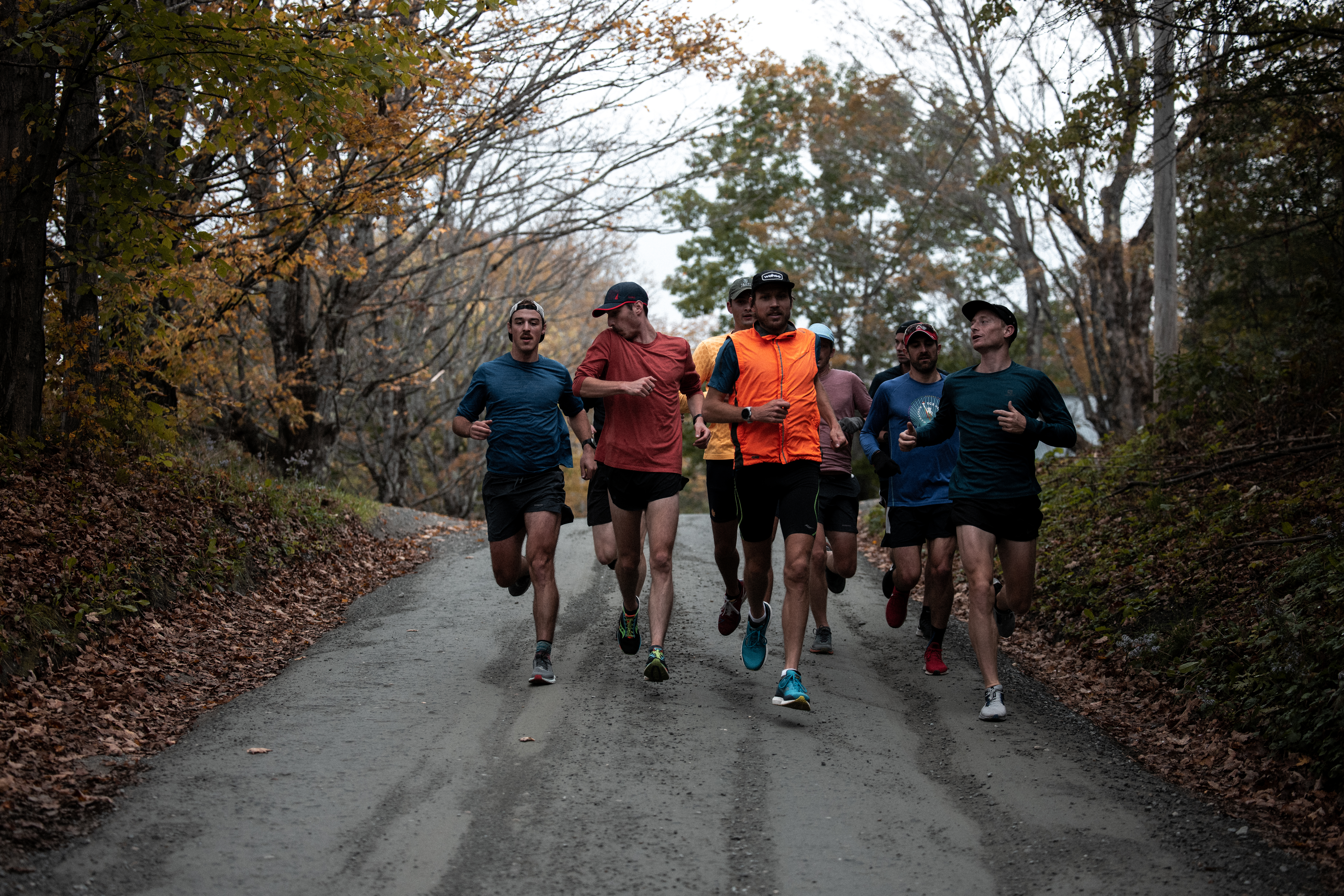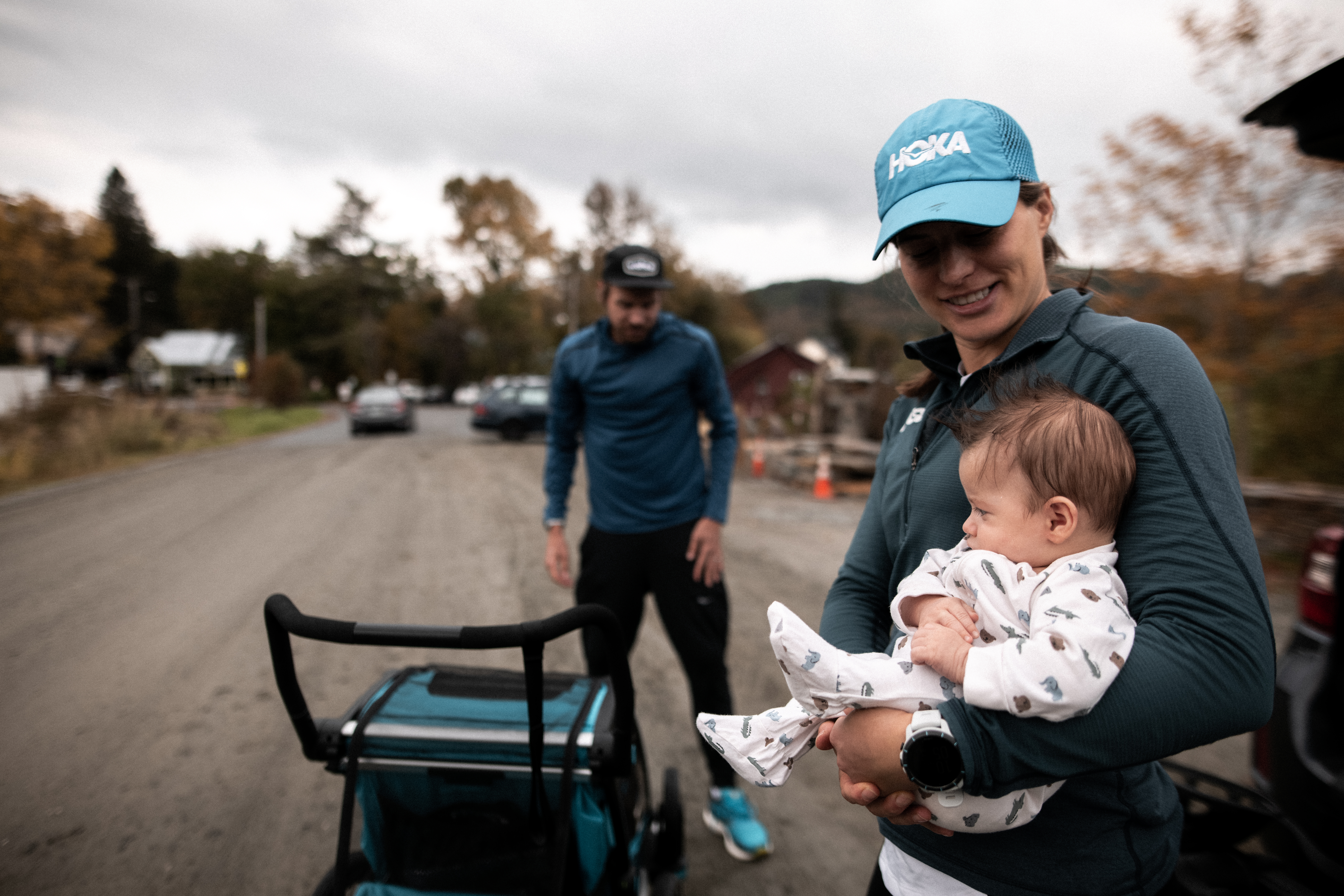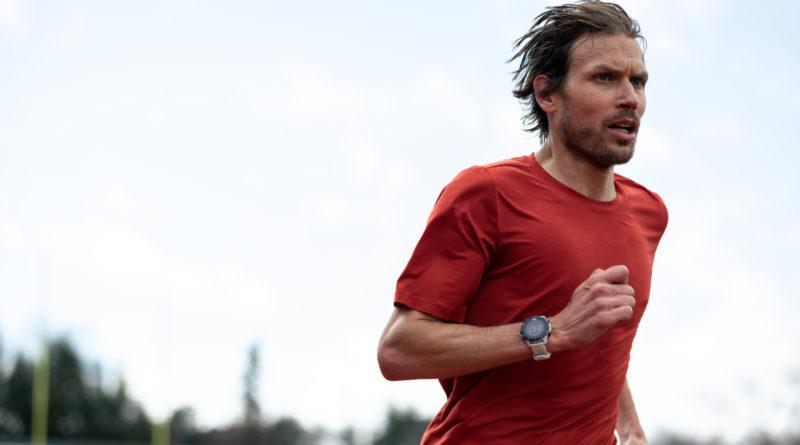A Faster Marathon: How Ben True Upped His Game
On November 7, 2021 Ben True stood at the start line of the New York City Marathon along with nearly 25,000 other runners. He’d never run 26.1 miles before. His recent training was mainly on the back roads of the Upper Valley and weekend forays on the dirt roads around Woodstock, Vt., an informal run with friends and locals, some pushing baby strollers; the “Tour de Woodstock.”
This was different. He knew he had to pace himself, to turn off the competitive switch that’s pushed him since he was a kid running high school meets in Cumberland, Maine.
True, an elite athlete who barely missed the qualifying for the Olympics, had also just lost a long-time sponsor , Saucony. And he’d recently spent $20,000 to persuade a training partner to move to the Upper Valley. The New York City Marathon was a chance to reinvent himself as a pro distance runner or… There was no “or.”
He set off fast with the lead pack. But before mile 4 he had let them go.
“THE BEST ADVICE I’ve ever gotten from a coach is patience,” says True, speaking from the home he shares in West Lebanon, N.H. with his wife Sarah True, the Olympic triathlete, and their infant son Haakon. True, 36, does not look like the typical elite distance runner. A former NCAA Div. 1 cross-country ski racer, he is 6 feet tall and 160-something pounds, broad-shouldered and strong-boned. His face has a chiseled handsomeness and his eyes, an intense gaze. His hair is in such a wild state of bedhead that if you ran into him on a dark road, you could mistake him for a northwoods hermit.
But then the Dartmouth grad smiles and speaks. He is funny, articulate and patient with questions he has had to answer over and over again.
Patience.
“Every high-performance athlete I know always wants to do more and to see results right away,” he says. “That’s not how it works. The only way you get better is by stressing your body and then allowing your body to recover and to make the adaptations to get faster.”
That same could be an analogy for True’s running career which has been characterized by streaks of brilliance and bouts of disappointment, all of which have led him to, in short, get better.
True grew up cross-country ski racing and running in the small town, of North Yarmouth, Maine. “Maine and Massachusetts are the only two states who have Patriot’s Day off so I grew up watching the Boston Marathon,” he remembers. His father was a marathon runner and he was inspired by another Mainer, Joan Benoit-Samuelson. “She showed us that someone from Maine could be competitive internationally in running and do really well. She really inspired me,” he says; Benoit-Samuelson later became something of a mentor to the young True.
True liked to win, to run faster than the other kids in his school. In 2002, as a high school junior he made it to the Foot Locker Cross Country Championships. He’d been running about 20 to 25 miles a week and finished ninth among all high school boys. The winner, Chris Solinsky, was putting in 100-mile weeks and would later break the U.S. 10,000 meter record. The next year, True finished fifth.
But skiing was the sport he was focused on at the time and at Dartmouth he made the World Junior Championship and helped the college to its first NCAA win in 31 years. While at Dartmouth, he also broke a 4-minute mile running at the 2007 New England Outdoor Championships.
The next winter True trained in Sun Valley with an Olympic development program for skiing. He overtrained though, and suffered from exhaustion. “I have a hard time slowing down. I wanted it so badly that I was refusing to listen to my body when it wanted to recover,” he told Aimee Berg in an article for Team USA.
After that, True focused on running. He graduated from Dartmouth in 2009 and headed to Eugene, Oregon to train with the Oregon Track Club.
At the 2021 New York City Marathon, the lead pack was an international who’s who of distance runners. There was Ethiopian Kenenisa Bekele, the second fastest marathoner in history Kibiwott Kandie, the Kenyan who held the world record in the half marathon and fellow Kenyan Albert Korir who had placed second in New York in 2019 were racing, too. There were strong Americans as well: Kenyan-born Elkanah Kibet, who trains with the U.S. Army World Class Athlete Program and Jared Ward, of Utah, who was sixth in the marathon in the 2016 Olympics. For most of them, running was a year-round pursuit, done with a team of coaches, physical trainers and pace setters. By the halfway mark, New Englander Ben True had moved into 13th place in the field. By mile 20, he was in 10th place and feeling good.

TRUE DIDN’T STAY LONG in Oregon and moved back East, first to Maine then to his college town of Hanover to join a new training group called In the Arena, formed by coach Tim Broe. Soon after, True won the 2011 10K U.S Road championships. Two years later he lead the U.S. team to finish second in the IAAF World Cross Country Championships.
When True came back to Hanover he was training on the Dartmouth track, but largely on his own. “I’m sort of a hermit and used to running by myself,” he says. “Plus, it was hard to find someone in this area to train with.” Still, True was able to convince another Oregon Track Club runner, Sam Chelenga, to come east and train with him in 2013 and 2014. True also started working with coach Mark Coogan – at the time Dartmouth’s coach and now the coach for the New Balance team and Vermont’s Olympic runner, Elle Purrier-St. Pierre.
True’s running career continued to speed forward. In 2015 he placed sixth in the 5,000 meters at the World Championship, the second American and was considered a strong contender for the 2016 Olympics, an event his wife Sarah True had qualified for in triathlon. But at the Trials Ben True finished 5th, missing out on a spot.
That was a bump in the road but not one that stopped him. In 2017 True broke his own American road record for the 5K and his time of 13:20 still stands. A year later, he won the New York Half Marathon, with a time of 1:02.39.
But after a while, Chelenga left the Upper Valley and True found himself thinking. “I really would like to have another trading partner.” He wasn’t going to move West. “Hanover is the biggest town I want to live in,” he says. “But,” he acknowledges, “the Upper Valley is not necessarily what most people think of when they think of running and runners, right? And it wasn’t like there’s any club or group or training environment here. It was basically just me wanting somebody to run with. And so it was a hard sell.”
Sell was what he realized he was going to have to do. “I wanted a training partner badly enough that I was willing to pay them a salary to do it.” True put the offer out there: $20,000 to move to the area. An elite runner named Dan Curts visited True and took him up on it. Then Curts convinced his friend Fred Huxham to move to the area. Soon, there were three of them out running the dirt roads. “So that’s when we got the idea of creating this training group, Northwoods Athletic,” says True. “The goal is to get a few top more runners coming in and, ideally, a few more female runners too,” he says.
“Everyone seems to think they have to be in the hotspots, which are Boulder or Flagstaff. But I think this area has fantastic training and the running is amazing. It’s far enough away from a lot of distractions, but yet it’s close enough that, you know, it’s not a hassle to go to Boston to get a plane to go to basically anywhere in the world,” he says. “So, we’re trying now is to build kind of a community of professional runners, and then use them to help inspire everybody else to get out there.”
“Community is what got us into running” is the lead quote on the Northwoods Athletics website. It’s a motto True takes seriously. On any given weekend, you might find True, Curts and Huxham loping through the quiet town of Woodstock, Vermont with a crew of friends jogging not far behind. It’s a run they’ve come to call the Tour de Woodstock. Locations and times are posted on Strava, which lists True’s weekly times and distances. “There will be dirt, there will be hills, there will be fun,” the Tour promises. Plus, coffee and waffles after at Abracadabra Coffee in East End Park. “If I wasn’t a runner, I’d be a coffee roaster,” True admits.
The run started during Covid as a way to safely socialize. True, his wife Sarah, Curts, Huxham and few others would meet Ansel Dickey – a friend, former pro bike racer and now owner of The Vermont Overland gravel race—in Woodstock. “We’d run then go have coffee and waffles,” True says.
“It started because Ansel wanted to get more into running,” True explains. “It was hilarious because the first few weeks he would turn himself inside out to try to stay with us.” True laughs. “But every week he got fitter and fitter. Seeing that, we decided we should open this up so anyone could join in.”

They extended the invitation via Strava. “I realized that running with other people is so much easier and so much more fun and I wanted to extend that to the community,” says True. The first weekend they had about 15, the next there were 35. There are now about 100 runners on the Strava list.
“It’s very low key and everyone goes at their own pace and we keep it so people can talk,” says True. “I’d like to see a couple of different pace groups but right now, it’s anywhere from a 6:30 mile to a 7:30 mile. I’d like to see it so that if you’re a 15-minute mile runner you can come and run and then hang out and drink coffee afterward.” He also noticed something. “Over the weeks, people really got better.”
How often do you get an invitation to come train from one of the top runners in the country?
In the last six miles of the New York Marathon, Ben True flicked the switch. He felt good – too good. “I might have beem overly conservative at the beginning,” he later acknowledged. Just before the race, he’d signed with Asics. “I like them and those were the shoes I probably would have worn anyway,” he says. At mile 20, there were 10 runners ahead of him and a big push by the pack. By the time he was close to the finish line, there were only six. True finished in seventh, in 2:12:53, just inches behind Bekele, the Ethiopian, who was sixth with a time of 2:12:52. True was the second America. Elkanah Kibet, who trains in Colorado Springs, was fourth.
Back home, True took 10 days to recover and then began his training again slowly. He won’t say what his next race will be. “Probably something in the fall,” he says. But for now, you can find him running on weekends in Woodstock, Vt. Probably with a gang of friends.
Opening photo by Fred


